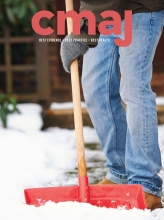An estimated 20% of Newfoundland and Labrador’s $3-billion health budget may be inappropriately and ineffectively spent at present, according to a provincial expert who is part of the Choosing Wisely Canada campaign.
“There is no doubt we have a problem with unnecessary testing. There is the same problem across the country,” says Dr. Pat Parfrey, a St. John’s-based nephrologist and clinical epidemiologist. Parfrey is the chief scientific officer with Choosing Wisely NL, part of a national campaign to spark discussion among clinicians and patients about needless tests and treatments. “It’s not so much about waste as getting the benefits and avoiding harm,” he says.
Choosing Wisely Canada has created lists for numerous health sectors, including family medicine and geriatrics. These lists identify tests and treatments that are commonly used but not supported by evidence, or that could expose patients to unneeded risk. Unnecessary and inappropriate medical tests, procedures and prescribing are jeopardizing the health of patients and the sustainability of the health system in Canada, maintain the campaign organizers.
Parfrey points to the use of computed tomography (CT) as an example of health care gone awry. “CT scanning entails an enormous amount of radiation,” he notes. “These tests mount up. You have the risk to the patient and it creates access issues.”
Choosing Wisely NL, launched late last year, is working on three proof-of-concept initiatives to underscore the need for effective assessment and insight into medical tests and medications. Two of the initiatives are targeted at physicians. One is exploring whether information sent to physicians regarding two kidney function tests — blood urea nitrogen and serum creatinine — will result in a decrease of simultaneous use of these tests. “[Physicians] have been trained to use both, but the evidence is clear you only need one or the other,” says Parfrey.

Unnecessary medical tests may subject patients to avoidable harms, add to costs and delay access for others.
Image courtesy of JohnnyGreig/iStock
Convincing physicians that change is necessary at the practice level can be difficult, he adds. “There is a universal knowledge in the health care system in the western world that we are over-utilizing resources. The issue is to try and get people to believe that in their own practice they are over-using resources.”
The utilization issue is not one of blame. Busy physicians cannot keep up to date with the myriad of new procedures and treatments, especially in family medicine, notes Parfrey. The family doctor “has to be expert in a thousand and one things.”











